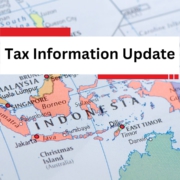Indonesia – Tax Information Update

More information about our PEO Indonesia: https://www.linkcompliance.com/services/services-peo-solutions/peo-indonesia/
In Indonesia, Personal Income Tax (PIT) is applicable to individuals at progressive rates ranging from 5% to 35%. Expatriates should be aware that PIT is determined through a self-assessment scheme, and the country follows a worldwide income taxation system. Indonesian tax residents must pay tax on both their domestic and foreign income unless a double tax agreement is in place. Non-residents are only taxed on income earned in Indonesia, subject to tax treaties.
Eligibility for PIT is based on an individual’s presence in Indonesia for more than 183 days in a 12-month period or having the intention to stay in the country. Factors defining “residing in Indonesia” include having a place of residence, vital interests, and habitual abode in Indonesia. The “intention to stay” requires supporting documents like a permanent stay permit or limited stay visa.
Foreigners who become domestic tax subjects are taxed only on Indonesian-sourced income if they meet expertise requirements. This expertise should be certified, and there should be an obligation for knowledge transfer to an Indonesian citizen. Certain foreign expatriates, like diplomatic personnel, military staff, and specific international organization representatives, are exempt from PIT.
Residents are subject to progressive withholding tax rates, while non-residents face a flat 20% tax on gross income. Deductions and relief are available, including deductions for individuals, spouses, and dependents.
The PIT rates for residents are as follows:
- Up to IDR 60 million: 5%
- Above IDR 60 million to IDR 250 million: 15%
- Above IDR 250 million to IDR 500 million: 25%
- Above IDR 500 million to IDR 5 billion: 30%
- Above IDR 5 billion: 35%
However, starting January 1, 2024, the PIT rates for residents will be withheld based on the new effective tax rates (ETR), as stipulated by Government Regulation No. 58 of 2023. These rates will be applied from January until November. Nevertheless, the annual calculation that is carried out in December is still done using the progressive income tax rate under Article 17(a) of the Income Tax Law as above, potentially leading to underpayment or overpayment in that month.
There are three categories of taxpayers based on GR 58/2023;
- Category A (Single with no dependent, Single with one dependent, Married with no dependent)
- Category B (Single with two dependents, Single with three dependents, Married with one dependent, Married with two dependents)
- Category C (Married with three dependents)
Employers are responsible for withholding and remitting taxes monthly, and expatriate employees must complete an annual tax return. Individual taxpayers, both residents and non-residents, can deduce specific amounts from their gross income when determining the annual taxable income.
Tax deregistration is recommended for expatriates leaving Indonesia to avoid continuous tax residency. To do so, they must submit an application to the local tax office.
Indonesia provides income tax exemptions for certain types of income, such as foreign dividends received by domestic taxpayers, subject to reinvestment requirements.
Reporting individual tax returns can be done directly at the tax office, through postal services, or authorized online tax services. It’s crucial for expatriates to seek assistance from registered local tax advisors to understand their tax liabilities and potential exemptions.









